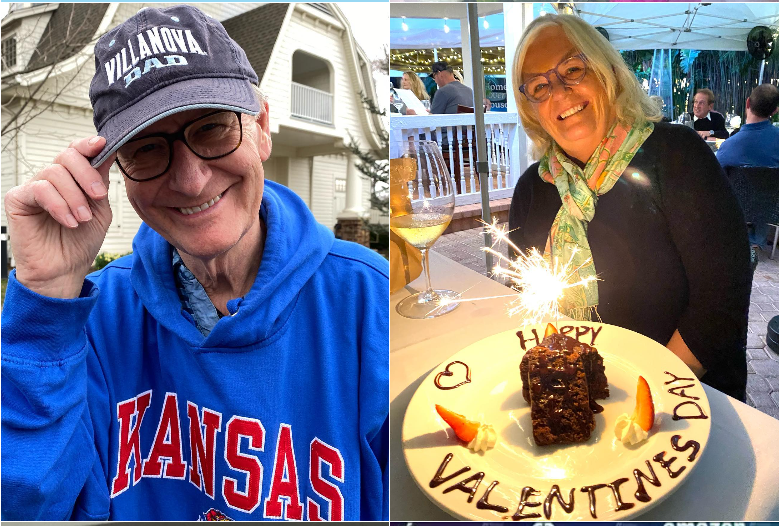It felt like the end of an era when Steve Doocy announced to the audience that he would no longer be glued to the Fox & Friends couch every weekday morning. He had been rising at 3:30 a.m. for almost thirty years, making his way into the early darkness of New York, and delivering the first talks of the day to millions of people. His announcement in May, delivered with his usual warmth, was about making room for other priorities rather than retiring. His family had been going through a very personal health battle, which had influenced those priorities.

In 2015, Steve and Kathy Doocy arrived at the New Jersey office of their neighborhood eye specialist with the straightforward goal of getting Kathy a prescription for sunglasses in time for their Florida vacation. But that visit changed their lives in ways they never would have thought possible. A tiny freckle at the back of Kathy’s eye caught the doctor’s attention; it seemed innocuous, but it was worth keeping an eye on. Three months later, they came back for a check-up. The tone changed this time, and the physician suggested seeing a retinal specialist “just to make sure.” Despite its calmness, the wording conveyed an implied seriousness.
Steve Doocy – Personal & Professional Snapshot
| Detail | Information |
|---|---|
| Full Name | Stephen James Doocy |
| Date of Birth | October 19, 1956 |
| Birthplace | Algona, Iowa, U.S. |
| Education | University of Kansas (BS) |
| Occupation | Author, News Anchor, Political Commentator |
| Notable Role | Co-anchor of Fox & Friends (1998–2025) |
| Spouse | Kathy Gerrity Doocy |
| Marriage Year | 1986 |
| Children | Mary, Sally, Peter Doocy |
| Known For | Fox News host, bestselling cookbook co-author |
| Current Role | Special projects host, broadcasting from Florida |
| Reference |
Before long, they were sitting through a full day of tests at Wills Eye Hospital in Philadelphia. The doctor’s words, “Kathy, you’ve got cancer, but I’m going to save your life,” completely changed the course of events when she finally entered the room. A rare diagnosis that frequently manifests silently is ocular melanoma. The three words, “you have cancer,” caused the Doocys to pause in a moment, gasping for air.
Kathy started radioactive plaque therapy, a precise treatment that needed to be closely watched for days. Her children visited her during the procedure, offering consolation and a sobering reminder of the seriousness of the situation. She started to consider her family’s future in the most personal way possible during those days—by looking back at the meals and recipes that had shaped their shared life. Even though she couldn’t be there to prepare them, she wanted her kids to eat those foods.
That resolve served as the inspiration for Steve and I’s co-authored series, The Happy Cookbook. Resonating with readers who recognized the power of food to convey connection and memory, what started out as a very personal family memoir became a national bestseller. The project, which began out of fear, turned into a source of happiness and unity and exemplified the couple’s resolve to turn adversity into something lasting.
Kathy was deemed cancer-free in two years, which was a remarkable outcome in bringing stability back into their lives. However, the encounter left its mark. Steve’s ability to balance his studio obligations with the uncertainty surrounding his wife’s treatment served as further evidence of the importance of presence over routine. His choice to work part-time from Florida now represents a move toward intentional living in a field that rewards continuous availability.
This choice is consistent with a growing trend of public figures redefining their careers in the wake of personal life turning points. Tom Brokaw’s career changes after being diagnosed with multiple myeloma and Robin Roberts’s reduced schedule after receiving a bone marrow transplant are remarkably similar. Even though these decisions are personal, they have an impact on how viewers view the relationship between public service and personal life.
Additionally, Kathy’s diagnosis had wider repercussions. More people are taking eye health seriously as a result of stories like hers that increase awareness of rare cancers. After hearing such stories, eye specialists have observed an increase in patients seeking screenings, which has a potentially life-saving and practical impact. Kathy’s story has significantly increased public awareness of preventative care, much like Angelina Jolie’s candor regarding her genetic cancer risk.
Support for Steve’s career change has come from coworkers, viewers, and even politicians. Even though he makes a joke about becoming the “coast-to-coast host” rather than the “couch host,” his decision has a deeper meaning. He is putting more emphasis on the aspects of life that provide fulfillment outside of career milestones by taking more trips with Kathy, spending more time with their kids and grandchildren, and working on special projects.
A shift in culture is reflected in this type of deliberate transition. A more flexible approach, where personal health, family needs, and creative aspirations can coexist with professional engagement, has replaced the traditional model of remaining in one demanding role until retirement. It serves as a reminder that being successful in any field doesn’t necessarily mean staying in one place for a long time; it can also mean moving into more meaningful and sustainable roles.
Adversity can serve as a creative catalyst, as demonstrated by the Doocys’ journey. The desire to maintain family customs in an uncertain time led to the creation of the Happy Cookbook, which is now a part of their shared heritage. In this way, Kathy’s illness did more than simply change their personal lives; it also unintentionally produced something that still provides solace to a great number of people.
For viewers who have followed Steve for decades, watching him go through this phase has reaffirmed a fact that is frequently ignored in the media: those who provide the news are also going through their own experiences. In a time when empathy can seem limited, the Doocys have humanized a public role by sharing aspects of their experience, thereby promoting connection.
